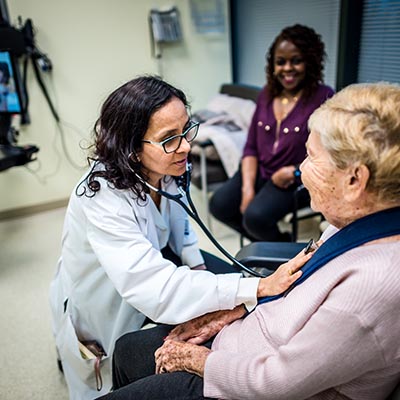How to Know if You Have Early-Onset Dementia

March 22, 2024
Most people with dementia are older adults, but sometimes, the condition affects younger people. When someone is diagnosed with dementia before age 65, it’s called early-onset dementia.
Experts aren’t sure why some younger people develop dementia – specifically, Alzheimer’s disease. However, the symptoms that affect young adults are similar to those affecting older adults.
“It is going to be a similar trajectory, where there is mild cognitive impairment first,” says geriatric medicine specialist Manisha Santosh Parulekar, M.D., division chief for geriatrics at Hackensack University Medical Center. “The classic symptom is having difficulties completing tasks that you were previously doing without any issues.”
Early onset dementia may affect people in their 30s to early 60s.
“The range can be wide, but a significant number of people are in the age group of 55 to 64, followed by 45 to 54,” Dr. Parulekar says.
Signs of Early-Onset Dementia
Some people may realize they’re having memory problems and then seek a doctor’s input. Other people may not notice a problem, but their loved ones do.
“Some people who start needing more help with their jobs or day-to-day activities come in for evaluation,” Dr. Parulekar says. “For others, a family member is concerned.”
Symptoms of early-onset dementia include:
- Memory problems that impact daily living
- Forgetting to go to work meetings, doctor appointments or other events
- Repeating the same questions over and over
- Having trouble with problem-solving
- Becoming confused in new or unfamiliar locations
- Forgetting how to get to frequently visited destinations without the GPS
- Personality changes
- Mood changes
- Irritability
- Being unable to communicate thoughts or find the proper words
“Some of the early signs are, ‘I need to write down on my calendar more often, I’m having trouble remembering new people’s names more than usual, I’m having a harder time finding things when I misplace them,’” Dr. Parulekar says.
Reasons to Seek an Early Diagnosis for Early-Onset Dementia
Since early-onset dementia is uncommon, doctors may not immediately consider dementia for younger adults, but getting diagnosed is key. Newer medications may help patients with early-onset dementia delay disease progression.
“These medications are only for mild cognitive impairment or mild dementia,” Parulekar says. “That’s why it’s important to get a comprehensive assessment.”
If you suspect that someone has early-onset dementia, see their primary care provider. Doctors can do an initial assessment and then refer patients to specialists when necessary.
“For referrals, especially for early-onset dementia, they should see a comprehensive dementia center, like ours,” Dr. Parulekar says. “Our patients get a comprehensive history of their memory loss including assessment for various risk factors, a detailed physical examination, targeted bloodwork, appropriate neuroimaging and neurocognitive assessment with a neuropsychologist.”
Sometimes, other conditions cause symptoms that may be confused with early-onset dementia. A thorough assessment allows an accurate and timely diagnosis and appropriate interventions.
“Sleep apnea, untreated thyroid disease, uncontrolled diabetes, certain vitamin deficiencies or untreated anxiety or depression can present as cognitive symptoms,” Dr. Parulekar says. “Many are treatable, manageable conditions, so it’s important to explore cognitive symptoms.”
When early-onset dementia is diagnosed, medication and lifestyle changes may be helpful.
“In the mild cognitive phase, addressing diabetes, high blood pressure, sleep, mood, can potentially help you stay in that [phase] for an extended period of time,” Dr. Parulekar says. “That’s why we want to make sure that you get a comprehensive assessment.”
Help for People With Early-Onset Dementia
People who are diagnosed with early-onset dementia may receive medication and practical advice. Doctors may refer patients to programs that may provide assistance.
“There are cognitive remediation programs that can help people with some cognitive tricks and exercises to help maintain functionality,” Dr. Parulekar says. “That’s another reason why we want people to seek help earlier than later.”
Doctors may advise patients how to maintain their lifestyle for as long as possible. Patients may need work accommodations or to learn to accept help from loved ones.
“The goal is to try to keep them as independent as possible by utilizing different resources,” Dr. Parulekar says. “This can potentially help them in a more supportive way, rather than trying to figure it out on their own.”
Next Steps & Resources
- Meet our source: Manisha Santosh Parulekar, M.D.
- To make an appointment with Dr. Parulekar, or a doctor near you, call 800-822-8905 or visit our website.
The material provided through HealthU is intended to be used as general information only and should not replace the advice of your physician. Always consult your physician for individual care.






